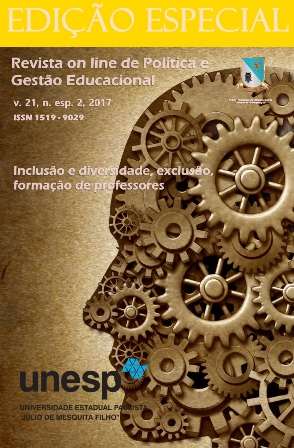Pedagogical practices of reception and inclusion: the perspective of critical pedagogy
DOI:
https://doi.org/10.22633/rpge.v21.n.esp2.2017.10370Keywords:
Pedagogical practices. Inclusion. Critical pedagogy.Abstract
This article highlights the possibilities of critical pedagogy in the organization of practices for inclusion and acceptance of students. It is based on the assumption that the epistemological principles of pedagogy, in the critical perspective, contemplate the bases of the necessary processes of inclusion, beyond mere acceptance, reaffirming that in a society of contradictory, exclusionary, unequal, oppressive relationships, the practice of Pedagogy must have an emancipatory form, in the continuous search for more humanity in men, what will be done through the transformation of the conditions that produce exclusion / oppression. Part of the following research question: what is the pedagogical meaning of inclusion practices? What contributions does critical pedagogy bring to these inclusion and welcoming practices? The current research is based on the follow-up of actions researches carried out in three municipalities in Brazil, focusing on the inclusion of popular students and also on theoretical studies of the meanings of pedagogy, pedagogical practices and the epistemology of critical pedagogy.Downloads
References
CCHARLOT, B. Relação com o saber, formação de professores e globalização: questões para a educação hoje. Porto Alegre: Artmed, 2005.
CONTRERAS, J. La investigación en la acción. Cuadernos de Pedagogía, Barcelona, abr. 1994, p.7-19.
FRANCO, M. A. S. A Pedagogia como ciência da educação: entre práxis e epistemologia. Tese de doutoramento. Universidade de São Paulo. São Paulo. 2001.
FRANCO, M. A. S. Pedagogia e prática docente. São Paulo: Cortez Editores, 2012.
FRANCO, M. A. S. Práticas Pedagógicas nas múltiplas redes sociais. In: LIBÂNEO, J. C.; ALVES, N. Doze temas da pedagogia: as contribuições do pensamento em currículo e em didática. 1ª ed. São Paulo: Cortez Editores, 2012a, v.1, p. 169-189.
FREIRE, P. Pedagogia da autonomia: saberes necessários à prática educativa. São Paulo: Paz e Terra, 1999.
FREIRE, P. Política e educação. São Paulo: Cortez Editores,1993.
FREIRE, P. A educação como prática da liberdade. Rio de Janeiro: Paz e Terra, 1976.
FREIRE, P. A Pedagogia do oprimido. Rio de Janeiro: Paz e Terra, 1975.
FREIRE, P. Cartas a Cristina. São Paulo. Paz e terra. Rio de Janeiro. 1996.
GENTILI, P. A. A. O discurso da "qualidade" como nova retórica conservadora, no campo educacional. In: GENTILI, P. A. A.; SILVA, T. T. (Org.). Neoliberalismo, qualidade total e educação. 2. ed. Petrópolis: Vozes, 1995.
LUKÁCS, G. Existencialismo ou marxismo. São Paulo: Senzala, 1967.
NÒVOA, A. Entrevista. Disponível em: http://www.cartaeducacao.com.br/entrevistas/antonio-novoa-aprendizagem-nao-e-saber-muito/. Acesso em: 20 jul. 2016.
PACHECO, J. Aula não ensina, prova não avalia. https://www.youtube.com/watch?v=rcH8YXGDeB8. Acesso em:21 jul. 2017.
SCHMIED-KOWARZIK, W. Pedagogia Dialética - de Aristóteles a Paulo Freire.São Paulo: Brasiliense, 1983.
VEIGA, I. P A. A prática pedagógica do professor de didática. 2 ed. Campinas: Papirus, 1992











